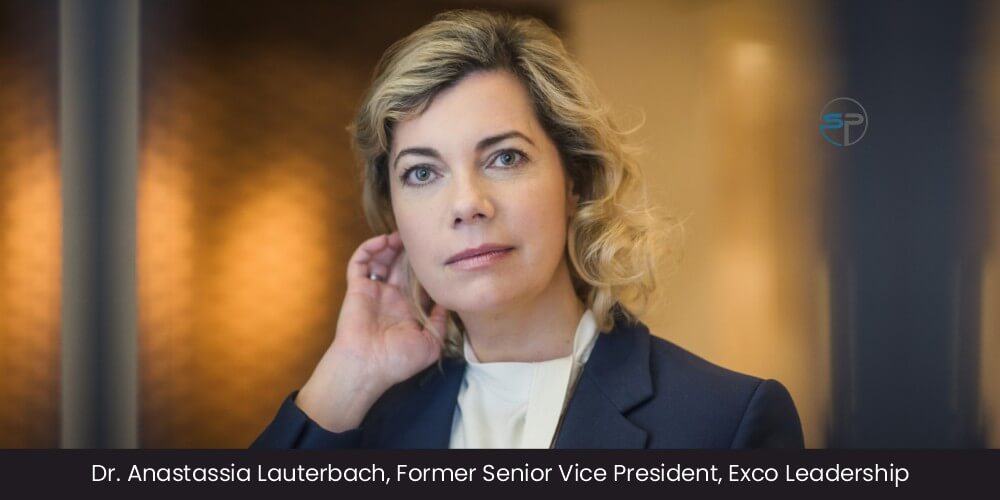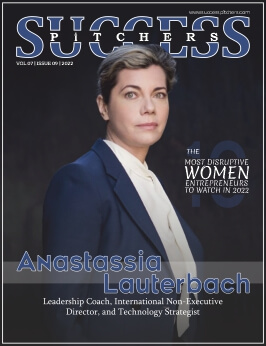Anastassia Lauterbach: Leadership Coach, International Non-Executive Director, and Technology Strategist
The 10 Most Disruptive Women Entrepreneurs to Watch in 2022

A seasoned global senior executive, entrepreneur, and board director, Dr. Anastassia Lauterbach considers that a few important attributes of an excellent leader are resilience, an irrepressible capacity to learn, agility, and personal humility. She believes that leaders need to be able to persuade others, and that persuasion goes hand in hand with tales that people can relate to.
Dr. Anastassia Lauterbach is a worldwide strategist and ICT industry thought leader who has successfully created mutually beneficial collaboration arrangements with global IT businesses. Lauterbach is also a seasoned board member who has worked on CEO succession and turnaround projects. She speaks six languages fluently (English, French, German, Russian, Serbian, and Croatian). She serves as a mentor to top executives and CEO succession candidates.
Lauterbach was formerly Senior Vice President of Europe at Qualcomm, where she was responsible for business development, go-to-market responsibilities, as well as managing growth in Europe. She previously worked at Deutsche Telekom as Senior Vice President of Business Development and Acting Chief Product and Innovation Officer, where she oversaw key divestitures and product rationalization, as well as reorganized the captive VC portfolio, initiating deals with major Silicon Valley VC firms and introducing third-party products for commercial traction. Prior to Deutsche Telekom she spent 10 years at McKinsey, Daimler and Munich Re, where she assembled experience in different industries in global markets, requiring hands on problem solving and collaboration in cross-cultural environments.
Dr. Anastassia thinks that value is not developed in silos in light of contemporary global political and business leadership settings. It’s collected inside ecosystems through collaboration and cooperation across supply chains, industrial clusters, and organizational structures. Great firms, she says, identify best practices for elevating diverse leaders and learning to function outside traditional reporting lines while still remaining accountable. She asserts, “Collaboration, personal humbleness, communication, and empowerment of people (with the means of technology and organizational practices) are ingredients of a modern workspace.”
Dr. Anastassia feels that senior executive teams and boards of directors need to be more informed of what is going on around the globe. It is vital to have an outside-in perspective on geopolitics, the technology environment, competitive challenges, and regulatory developments. She understands that being honest about the company’s strengths and weaknesses is crucial (necessary) for building relevant operational roadmaps. She goes on to say that customer attention and listening to consumers’ opinions are critical, and that they can’t be achieved without connecting with customers on the front lines, even if it’s only on a rare occasion. “Putting people with diverse backgrounds around the table is very important too, as it debiases the strategy creation process,” says Dr. Anastassia.
Innovation, Disruption, and Protection
At the beginning of the millennium, the 10 largest German DAX companies—Telekom, Allianz, Siemens, Daimler (today’s Mercedes), SAP etc.—were each significantly more valuable than the largest global digital companies like Amazon, Google, Tencent, or Facebook. Almost 20 years later, the relationship has been turned upside down: Alphabet alone is now worth more than the largest DAX companies put together1.
Data is an economic energy source, with the main players headquartered on the West Coast of the United States or the East Coasts of Asia. Only a quarter of all European venture capital investments are made in the United States. Germany, the world’s fourth largest economy, and Europe as a whole are failing to extract true value from data. European innovation must solve the continent’s digital marginalization. This will necessitate fresh thinking. Instead of lamenting the loss of digital monopolies, businesses could consider decentralized data marketplaces on blockchain, organizing data trusts with coopetitors for R&D purposes, invest in small data technologies, and review their hardware strategies, e.g., cooperating with universities on semiconductors technologies, and/or looking for solutions outside of big tech platforms.
As data is now the lifeline of every organization, Dr. Anastassia feels that technologies like Machine Learning, blockchain and cybersecurity should be an integral piece of every operational plan. Specifically Artificial Intelligence is entering every single industry, getting embedded into products and services, like it used to be with electricity 100 years earlier. Technologies enable growth and efficiency of operations, and therefore technology literacy in top leadership teams and corporate boards is essential for sustainability and resilience of businesses.
Emblem of Model Leadership
The corporate vision must be clear and concise. Dr. Anastassia points out that if a firm creates widgets, its mission may not be to make the greatest widgets on the earth, but to improve the lives of the people in its neighborhood. She also emphasizes the need to avoid useless slogans.
Dr. Anastassia is a firm believer in the OKR (Objectives and Key Results) approach, which entails defining difficult goals for everyone in the business, being transparent about them, and translating them into concrete plans without fear or hesitation while cultivating a collaborative culture. She thinks that both the senior leadership team and the corporate board of directors must devote significant resources to culture and talent. As per her, good people development, healthy succession plans, celebrating alumni networks (success within and outside of the current employee base), and zero tolerance for toxic behaviors foster trust. She says, “Trust is the glue to hold moving pieces of strategy together.”
Modern leadership is all about inclusivity, and inclusivity can’t be obtained in strictly hierarchical structures. Guiding workforce with influence rather than in command and control manner might not come naturally to some executives, but it can be learnt. Anastassia argues that more junior employees want to be a part of a wider company network. She believes that if there isn’t an open channel of communication between the board and management, the firm is doomed to fail in corporate governance, and maybe even in its whole existence. She adds, “Great executives don’t need to hide information. They are transparent. Great board directors are generous with their time and can connect corporate leaders with people who might bring more value.“
Dr. Anastassia spends a lot of time on mentoring and connecting with her team to enable new opportunities. She says, “Generosity comes natural to me, and I think it comes back to the most valuable currency—trust.”
Prioritizing self-care
Dr. Anastassia does not believe in the notion of work-life balance. She believes work is a necessary aspect of life. The dilemma is whether employment only depletes energy or might provide fulfilment and joy. She does, however, believe in self-care, which includes both physical and emotional well-being. No one can work 100 hours a week and maintain their health. Workaholism is a symptom that an executive is unable to focus and priorities well. Dr. Anastassia prefers that her teams have supper with their families. She wants decent parental leave regulations that apply to both men and women. She believes that excellent commuting practices should be designed, and that hybrid workplace arrangements should be available for individuals who are not required to be on site with consumers. She supports access to information on mental health and nutrition.
Dr. Anastassia wishes for compassion among executives. She claims that compassion emerges when leaders listen to their employees, walking through the office cafeteria and sitting down with random folks to talk about what’s going on. She also wants honesty when discussing the work-life balance of female employees. “Most of them can’t balance, especially if they don’t get top salaries to afford top care for children and elderly parents. Addressing the pay gap is just a start to getting help to women, who are still mostly affected by the restrictions of COVID, and traditional views on the role of a woman in society and family,” says Dr. Anastassia.
A Wide Perspective on the Future
While referring to Albert Einstein’s famous quote, “we cannot solve our problems with the same thinking we used when we created them,” Dr. Anastassia sees companies, policy makers, and community leaders needs to collaborate to solve problems like climate change and inequality. She states that the use of fossil fuels boosted the industrial age in the past. Today, the world needs to transition to new forms of energy, which is by no means simple. She asserts, “No company can move the world to net zero on its own. Complex supply chains must shift. Corporate leaders are speaking up. Jeff Bezos signed the Climate Pledge, along with one hundred further companies with $1.4 trillion in annual revenue and more than five million employees around the world. Investors and Innovators like John Doerr and Bill Gates provided tangible plans on how to get to net zero. Just study their recent books.“
According to Dr. Anastassia, inequality has always been an element of human culture. Globalization has helped millions of people escape poverty in recent decades, but it hasn’t always helped to reduce inequality in the western world. Today, great minds are debating the future of capitalism. Sustainable and sustained growth are concepts that are now being incorporated into company strategies and roadmaps. Radical awareness of current geopolitical risks, technology disruption, and innovative technologies is crucial to shape competitive strategies for the better world. The task is by no mean easy. Setbacks are guaranteed. Complacency is not optional.
Website: www.excoleadership.com










